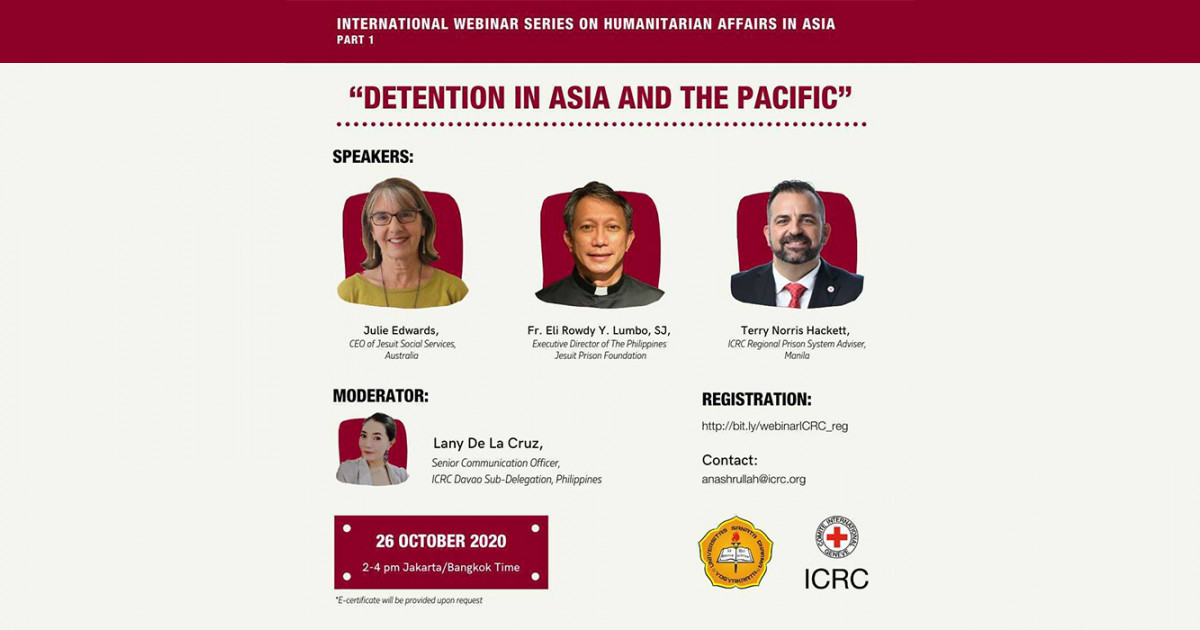 In line with the second Universal Apostolic Preference–walking with the excluded, the poor, the outcasts, those whose dignity has been violated, in a mission of reconciliation and justice–Sanata Dharma University (SDU), the Association of Jesuit Colleges and Universities in Asia Pacific (AJCU-AP), and the International Committee of the Red Cross (ICRC) recently hosted a webinar on Detention in Asia and the Pacific. Dr Johannes Eka Priyatma, President of SDU, introduced the first in a series of three webinars that focus on humanitarian affairs in Asia Pacific, from detention to forced displacement and access to education.
In line with the second Universal Apostolic Preference–walking with the excluded, the poor, the outcasts, those whose dignity has been violated, in a mission of reconciliation and justice–Sanata Dharma University (SDU), the Association of Jesuit Colleges and Universities in Asia Pacific (AJCU-AP), and the International Committee of the Red Cross (ICRC) recently hosted a webinar on Detention in Asia and the Pacific. Dr Johannes Eka Priyatma, President of SDU, introduced the first in a series of three webinars that focus on humanitarian affairs in Asia Pacific, from detention to forced displacement and access to education.
The Asia Pacific region is rich in tradition and culture, is a leader in technology, and noted for its economic growth and development. But this densely and diversely populated continent still struggles with a slew of issues related to such rampant progress. Widespread poverty and inequality, social justice, and human rights remain problems in several countries. Prisons, in particular, are overcrowded, underfunded, and often have inhuman living conditions.
Unsurprisingly, governments tend to give prisons and prisoners low priority, while civil society often has little sympathy for them. To provide context, Julie Edwards, Chief Executive Officer of Jesuit Social Services in Australia, shared that about half of persons deprived of liberty (PDL) come from the same locations, and share a similar background of dysfunctional families, exposure to violence, abuse, and mental illness–highlighting the fact that a significant number of PDLs come from disadvantaged backgrounds to begin with. The International Jesuit Prison Network has been working hard since 2013 to create a just, humane, and effective justice system that reflects the dignity of all people.
In countries like Thailand and the Philippines, infamous for their prisons, helping PDLs is a huge part of reaching out to those who are most in need. In Thailand, Vilaiwan “Kep” Phokthavi has worked with the Jesuits for many years; she is the Director of the Jesuit Foundation-Prison Ministry there. Their programmes serve thousands of PDLs in Bangkok and other provinces. Meanwhile, the Philippine Jesuit Prison Service (PJPS), established in 1994, continues its mission to share the transforming love and mercy of God through the holistic rehabilitation of PDLs, including their families and the prison community as a whole. Fr Eli Lumbo SJ, Executive Director of PJPS, emphasised giving PDLs a sense of dignity and value: “If trash has value–what more a person?” An insight Fr Lumbo shared is that it is not about judging PDLs, “as we do not know their real and complete stories”. Focused on rebuilding lives, rekindling hope, and restoring dignity, the programmes of PJPS provide socio-pastoral needs–spiritual, medical, and legal, including basic necessities like soap and water for the inmates, education for their children, and advocacy for prison reform and awareness. They have also lobbied against the death penalty, which still exists in Asia Pacific, but has seen a decrease in number of executions over the years.
Another guest speaker, Terry Norris Hackett, Regional Prison System Adviser of the ICRC, introduced the organisation and elaborated on the actions they have taken to identify and address certain challenges through visiting places of detention, interviewing detainees, discussing with staff and dialoguing with authorities. Overcrowding is a big problem, especially during the pandemic. Covid-19 has compounded the issue, and detainees are vulnerable. Their efforts include health services, improving conditions of detention, and judicial guarantees.
There remains a lot of work to be done in prisons and with PDLs. Fr Albertus Bagus Laksana SJ, Dean of SDU’s School of Theology, mentioned during his closing remarks that it is about touching on the real lives of people. Fr Laksana cited Fratelli Tutti, the encyclical of Pope Francis, which calls on all Catholics to work for the abolition of the death penalty. Indeed, crime must be punished but the dignity of every person should be upheld, so that reformation can happen and hope never lost.
The next webinar on Forced Displacement in Asia is slated on 20 November, and the last in the series, Access to Education in Armed Conflict Setting, will be on 11 December.
